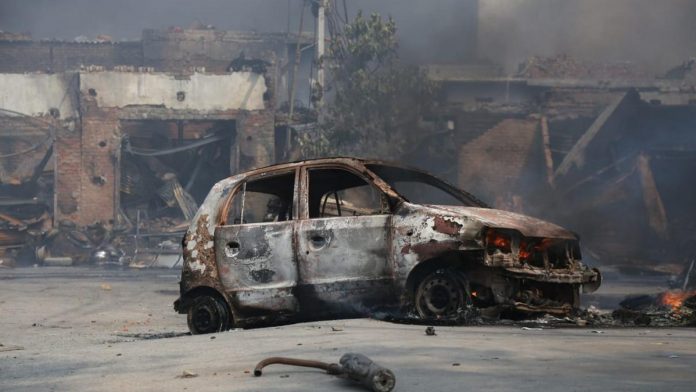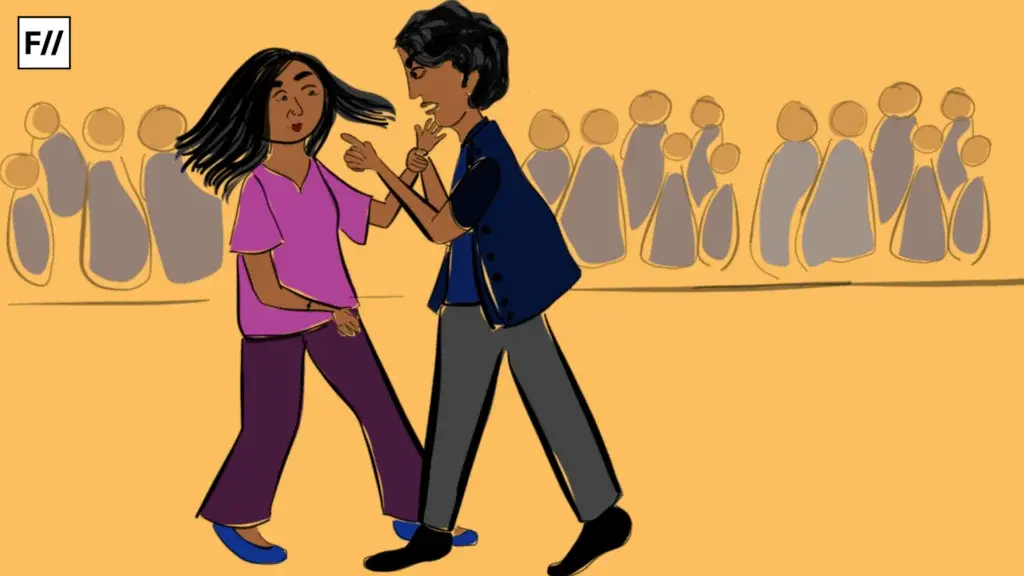The past 72 hours have witnessed North-east Delhi turning into a violent site. The images of the Gujarat pogrom of 2002 have flashed before the eyes as we relive the horrors of a state-inflicted rampage. Disturbing images of mosques being desecrated, property being destroyed and human life being sacrificed has been emerging every hour.
The outrage over the violent outbreak has taken social media by storm, where even ministers who ideally should have acted upon their powers to stop the increasing violence, only resorted to making tweets. Accusations are being thrown around as netizens are holding their political leaders accountable for the degeneration. With the recent conclusion of the Delhi Elections, the limelight has especially been on third-time Chief Minister (CM) Arvind Kejriwal. Aam Aadmi Party supporters have been defending their supreme leader under the pretext that ‘law & order’ falls under the prerogative of Union Ministry of Home Affairs. If that is so, who is to blame? Who should be held accountable and who can actually take cognisance of the situation?
The Bharatiya Janata Party has been sowing the seeds of communalism subtly since 2014. Their manifesto in 2019, however, did little to cover the agenda of forming a ‘Hindu Rashtriya’, outlining the different policies which would be the means to achieving this end. The last two months saw the fissures developing over the contentious Citizenship Amendment Act which systematically excludes Muslims. This was further fuelled by BJP leaders during the Delhi Elections. The most noteworthy of them was Anurag Thakur’s sloganeering which directly called for violence against the ‘traitors’ of the country. In the recent days, Kapil Mishra, former MLA, issued an ultimatum to Delhi Police over the indefinite protests against the CAA, warning that inaction would lead to him taking matters into his own hands.
In a tweet, he appealed for peace but conveniently ignored the role of his supporters in fueling the situation. The person who first bears the responsibility of ensuring peace during a tumultuous event is the Prime Minister. Not only can he condemn and restrain the leaders of the movement, he can also call for immediate relief by implementing a partial curfew.
The Prime Minister, the main power wielder in this situation, has remained silent over these incendiary remarks by his party members. In a tweet, he appealed for peace but conveniently ignored the role of his supporters in fueling the situation. The person who first bears the responsibility of ensuring peace during a tumultuous event is the Prime Minister. Not only can he condemn and restrain the leaders of the movement, he can also call for immediate relief by implementing a partial curfew. The President, who appears to be a nominal head, can also issue an ordinance which mandates a curfew, on the advice of the Prime Minister.
The Home Minister, Amit Shah has absolute powers when faced with internal unrest. Footage has shown the complacency of the Delhi Police and in some cases, blatant encouragement. The first step that Amit Shah could take would be to ensure that the Delhi Police executes their duty of protecting the citizens instead of being bystanders to the events. He also has the mandate to call in the CRPF, BSF, and/or the army if the situation escalates. The alarming matter here is that according to tweets by the MHA and National Security Advisor, the situation is ‘under control’. However, it is a well-known fact that everything is far from being normal. The death toll has been on a consistent rise and FII is keeping a close watch on the official figures.
Also read: Shaheen Baghs Of East Delhi: Protests Against CAA Continue
The Supreme Court also has the authority to take suo moto cognizance of the situation under Article 131 of the Indian Constitution. Over the last couple of years, the apex court has come under immense pressure in maintaining peace in the country. In a tweet, they expressed explicit concern over the disturbing events of the last two days. Supreme Court has already cracked down on Delhi policemen for their failure in performing their fundamental duties as uniformed officers of state. The courts can also issue orders to relevant Ministries demanding prompt action. They also have the mandate to pull up individual officers, holding them accountable to their office. The lower court has already issued warning statements to the Government of India to ensure that another 1984 is not repeated.
The Chief Minister of Delhi, Arvind Kejriwal is limited in terms of constitutional actions he can take to prevent the escalation of the situation. Under the Section 129 Criminal Procedure Code, the Executive Magistrate who reports to the CM can call upon the police to stop unlawful assembly for public security. Additionally, the Executive Magistrate can also request for deployment of armed forces under section 130 of the same code.
The Chief Minister of Delhi, Arvind Kejriwal is limited in terms of constitutional actions he can take to prevent the escalation of the situation. Under the Section 129 Criminal Procedure Code, the Executive Magistrate who reports to the CM can call upon the police to stop unlawful assembly for public security.
The CM has the right to demand action for Delhi citizens through the Lieutenant Governor, currently, Anil Baijal. Most importantly, the CM can direct relief to the victims. The AAP government holds 62 seats in the Delhi Assembly giving them immense ground in providing swift action. The CM has also refrained from mobilising the elected MLAs and party cadre who could potentially play an effective role mitigating the situation on ground.
Also read: Fear Of Fearless Women In CAA Protests: Male Politicians And Their Fragile Masculinities
The alarming situation in Delhi requires the various stakeholders to take action before it turns into a full-blown pogrom. Public pressure has definitely led some of the leaders to be more proactive. Delhi Chief Minister has finally decided to visit the affected areas and after 2.5 gruelling days, the cops have registered over 18 FIRs and have arrested over 100 people. It is not safe to say that things have calmed down and as active citizens there are few things one can do.
Residents of Delhi should call or visit their MLAs (numbers available on myneta.info or affidavits on eci.gov.in), join protests, and most importantly, protect their Muslim neighbours under all circumstances. The ones who are living away should amplify voices by being constantly engaging with each other, digitally and offline, join protests in their cities to mark their dissent. Mounting pressure on the government can potentially evoke action from the political masters and save our capital from burning!
Featured Image Source: The Print
About the author(s)
Ananya Chhaochharia is a political junkie, teacher and intersectional feminist. When she isn't getting high planning electoral campaigns for political parties, she runs operations for a non-partisan youth organization in public leadership. Dismayed by the abeyance in information related to menstruation in rural India she founded Paint It Red, an organization that aims to empower women through knowledge.




